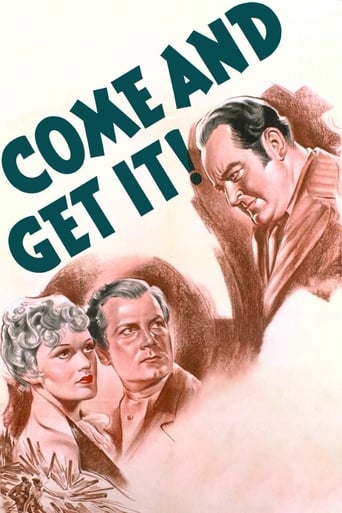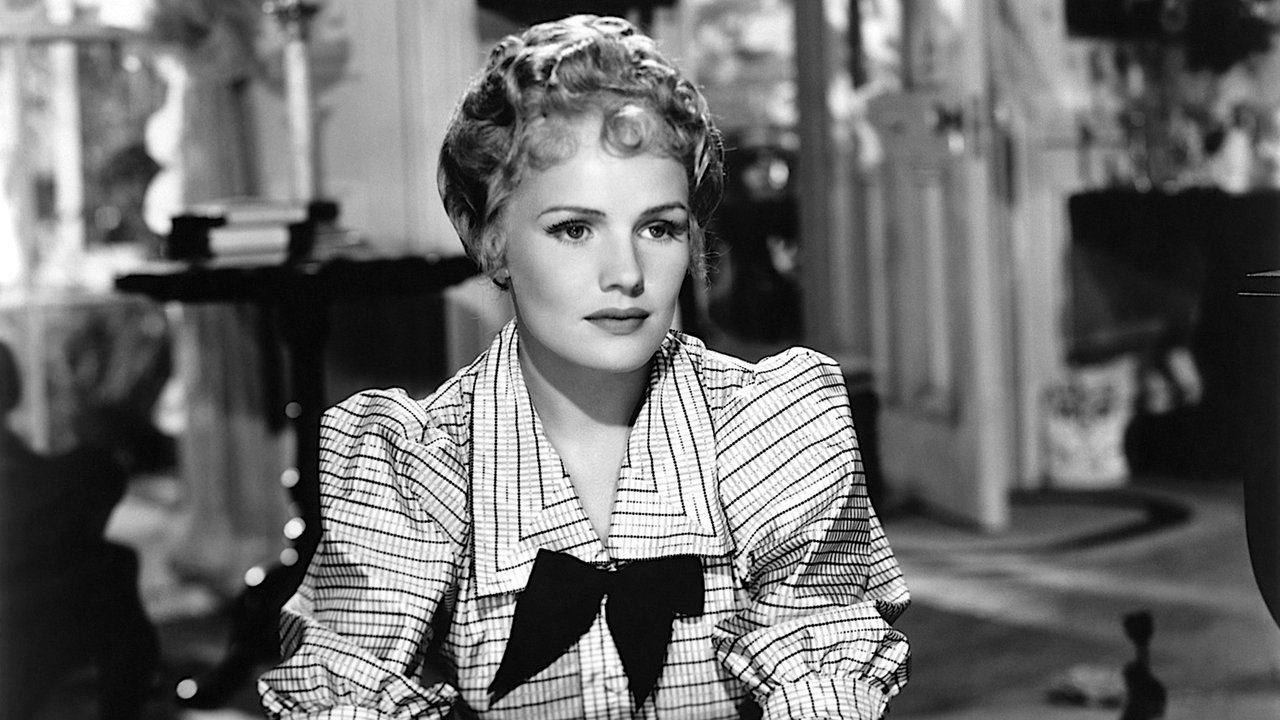mark.waltz
Giving perhaps his greatest performance, veteran character actor Edward Arnold plays a bombastic owner of a logging camp who eventually becomes the powerful head of a huge lumber company. Along side him throughout his journey is the noble Walter Brennan, a Swedish immigrant who married the lovely barmaid Frances Farmer after Arnold married a stuffy society matron. Years go by and the now widowed Brennan introduced his softer daughter (also Farmer) to Arnold, leading to a romance between Arnold's son (Joel McCrea) and the young Farmer."Yumpin' Yimminy!" are the repetitive words which won Brennan the first ever Oscar for Best Supporting Actor. Actually, it is more than just that, but if I were to play a drinking game every time he said it, I would be Schbockered pretty fast. Unlike the annoying El Brendel, Brennan is much note tolerable and less stereotypical. Farmer is terrific in the opening sequence, but her second character is not as interesting, a standard movie heroine who is rather bland. The song that re-appears through the film does indeed have the same music as the Elvis Presley hit "Love Me Tender" with old-fashioned style lyrics. For me, the highlight is the logging sequence at the very beginning, although it is sad to see all those trees chopped down. A bar brawl turns comical due to the addition of frisbee like trays.Among the supporting cast are Mary Nash ad Arnold's cold-hearted wife, Andrea Leeds as Arnold's lovely daughter, Mady Christians as the younger Farmer's companion, and the always fun Cecil Cunningham as Arnold's acerbic secretary. Arnold is likable in spite of his patriarchal personality, repeating the movie title over and over with such passion, even when he is sad.
tomsview
"Come and Get It" has an unusual story and seems ahead of its time in taking a stance about the environment. It is also a chance to see Francis Farmer at her best in the only one of her movies she actually liked. Proving that blondes don't always have more fun, Francis Farmer had more drama off-screen than any character she ever played on-screen. But as "Come and Get It" reveals, she projected a strong presence and possessed beauty that would have attracted attention in any decade of cinema. Star of the film was Edward Arnold who plays entrepreneurial lumberman, Barney Glasgow, over a period of twenty years, from age thirty to fifty. Unfortunately Arnold had the sex appeal that one would expect from a balding, thick-waisted and double-chinned man of 46 – his real age. For him to convincingly play a virile thirty-year old was quite a stretch.Set in Wisconsin in 1884, Barney takes a shipment of lumber to the sawmill in Iron Ridge with the help of his friend Swan Bostrom. Walter Brennan plays Swan. Unlike Edward Arnold who always looked middle-aged, Walter Brennan always looked old. Here he looks positively ancient, despite the fact that he was only 42 at the time. The boys meet Lotta Morgan, played by Francis Farmer, the resident chanteuse at a nearby saloon. Her portrayal of Lotta, especially in her early scenes is bizarre. Chewing gum and talking out of the side of her mouth, she sings two versions of the same song. Francis Farmer had a surprisingly deep voice and the song is so slow and dirge-like that she sounds like an old Gramophone record playing at the wrong speed. Fortunately her performance becomes less affected as the film progresses.Barney and Swan fall for Lotta but she falls for Barney – thick waist and multiple chins notwithstanding. However, Barney is already engaged to the daughter of a powerful timber tycoon, Emma Louise Hewitt played by Mary Nash. Barney leaves to marry Emma, an act that will cement a financial partnership with her father, leaving Swan to break the news to Lotta. She is hurt but now also unemployed. Swan offers to marry her. Lotta accepts although Swan looks old enough to be her grandfather.Twenty years later, Barney now owns a huge paper mill, and has a son Richard, played by a youthful Joel McCrea. Barney accepts an invitation from Swan to visit him in Iron Ridge. We learn that although Lotta died some time before, Swan has a daughter who is the spitting image of her mother, also named Lotta. Francis Farmer plays both roles, bearing out an enduring Hollywood maxim that the grown-up child of a parent who dies earlier in the film should be played by the same actor. Barney falls for Lotta Bostrom, and tries to recapture the feelings he had for the mother through the daughter. Barney is ardent in his pursuit of her while Swan seems amazingly accepting of Barney's inappropriate advances towards his daughter. After Barney convinces Swan and Lotta to accompany him back to the city, she falls in love with Richard Glasgow, Barney's son. Events come to a head when Barney catches Richard with Lotta. Eventually Barney receives the long-delayed reality check he needs to bring him to his senses.Although "Come and Get It" doesn't quite fit into the mainstream of Hollywood films of the 30's, it holds up much better than most of them, and offers a rare glimpse of an intriguing and ill-fated star.
Ken West
What a great surprise! This is the only Frances Farmer movie I have seen, and I have never seen Edward Arnold play such a multi-dimensional character -- and how well he does it.So many great moments: The first Lotta first singing Aura Lee in the saloon, the bar-room fight, the first time Barney sees the young Lotta, the lovely quartet of "The Saucy Little Bird in Nelly's Hat", the taffy scene . . . and many more.But what I enjoyed the most was the dynamics between the characters: dynamics beautifully written and flawlessly executed. Barney' clever wooing of Lotta I, the genuine friendship with Swan, the tension with his son (even before the triangle develops), the camaraderie with his daughter, his stoic patience with his wife whom he married for money -- all of these were richly done but with taut understatement. Even the few scenes with his secretary are so neat: exuding the subtle tension of two stiff wills who don't need to articulate the ways in which they need each other.Son Richard too, (played by Joel McRaea who seems to get short shrift in some reviews here), has some fine interplay with other characters. The taffy scene for sure. Also the office scene where Josie the secretary, cool-as-you-please, plants the suggestion about his father and Lotta II. And what about that little give-and-take with his mother, when at breakfast he challenges her as to whether she "ALWAYS" addresses her husband as "Mr. Glasgow"? No need for a nudge-wink -- just a quick look to complement the deft script.Frances Farmer as the 2 Lottas is stunningly gorgeous, obviously, but that does not preclude her performance from keeping up with the others. She makes believable how Lotta I succumbs to Barney's blandishments, and her reaction when she is told that he has deserted her is almost cutting. As Lotta II, her ambiguous response to Barney's advances is perfectly done and contributes to the ongoing undercurrent of tension that I found pervasive throughout.Yes, Walter Brennan's Swedish accent seems a little much, but never having talked to a Wisconsin Swede, who am I to judge? More important is, again, the dynamics of his character Swan with the other principals, such as the painfully delicious scene in the saloon when he tries to get a word in, edgewise, as Barney makes his moves on Lotta I. Beautifully written, beautifully executed. Partly because it was a surprise, I admit to being blown away by this 73 year-old movie, and it gets a rare "9" from me.
rixrex
This is one of the best Hollywood productions of the 1930s and, in my opinion, of the 40s and 50s as well, when so many dramatic films were either overly cynical (40s) or too syrupy (50s).Superb acting by leads who are believable people and not 'pretty boys'. A fine dramatic story that has the right pacing and the right dialog, and a wholly believable ending.It is something I'd have expected from the great filmmakers of France or Italy during this period, such as Renoir, but not from Hollywood.The kind of film that gets better with each viewing and as time passes.Definitely one to look for if you have not yet seen it!


 AD
AD


